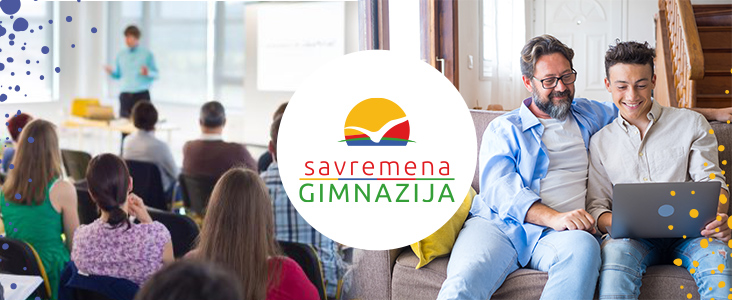Parenting for Academic Success programme
LINK edu Alliance and Savremena Gimnazija designed the Parenting for Academic Success programme with the aim of strengthening the role of parents in the academic development of students. Expert associates of Savremena Gimnazija, in continuous cooperation with students' parents, detected the specific needs of parents for information necessary for the academic, socio-emotional and professional development of students.
Bearing in mind that parents are the school's best partners in education, Parenting for Academic Success allows us to involve parents in cutting-edge education and further increase the chances of successful and promising education for their children.
Parenting for Academic Success programme workshop topics
Savremena Gimnazija has prepared ten workshops for parents where you can get all the information about the academic development and socio-emotional state of your teenager.
Career Counselling: How to support your child in choosing his/her the next step
The basic stages of choosing a career path are: getting to know your interests and abilities, getting information about possible educational paths, and making a decision. The most important supporters of young people in making that choice are their close people, most often parents. The adult's open-mindedness and patience to listen to the child's wishes and needs, as well as giving them the opportunity to discover their abilities, is the beginning of a common path toward the independence of a young person. If you would like to find out what are the difficulties that you as parents may encounter along the way and how you can overcome them, we suggest that you visit this workshop.
Psychoactive substances
What are addictions, and how are they developed? How are they treated? What do psychoactive substances look like today and how much do we know about them? Where can young people learn more about this? Where can parents get more information on this topic?
Rules, consistency, and structure as a support
The biggest allies in creating a healthy atmosphere in every community – family, school, club, and teams – are precisely the rules, structure, and consistency in their adherence. Rules can be clearly defined in official documents such as rulebooks (in school) or implicit and not always spoken (as within a family). We saw that structure is very important when we were going through the period of adapting to life with the COVID-19 pandemic, i.e. several months of quarantine at home – we lost our work habits, disrupted our sleep, and the boundary between school/professional and private life changed. Regular attendance at school and the organisation of afternoon activities (extracurricular activities, socialising) are often key factors in the general sense of satisfaction of students.
In all this, adults (school representatives and parents) should show consistency and model how to function optimally with rules and structure.
Activities with teenagers: How to start a conversation
When we talk about development, it is expected that your teenager wants to be in a peer environment. Parents will often be the initiators of spending time together. Joint activities, such as doing housework, crafts, walking the dog, and going shopping can be a context in which the child can more easily start talking about everyday activities, but also about his/her worries. Focused conversations, as the name suggests, can be an opportunity when you can devote yourself completely to your interlocutor, in this case your child, without using your phone or having your TV on.
Decision-making – a process
It is important to follow all stages of the decision-making process: the dilemmas the child has, possible options, what the child thinks the goal is and what are all the steps that need to be taken to reach the goal. Also, one should evaluate which people the student lets into his/her circle of "advisors" when making a decision and whether he/she will take the advice of friends, parents, coaches, partners, etc. Another important step in that process is taking responsibility for the decision made and teaching children to really be responsible for the decisions made.
I have a problem: Who to contact
- Drawing parents' attention to who is their support network at school – the class teacher, pedagogue, psychologist, subject teacher, etc.
- Creating an ecomap – what is a family support network
- Encouraging children to talk and seek support
- Important adults – learning by model
- What do I do when I have a problem
Friends – the child's peer environment
Peer influence during puberty is very significant. That’s completely predictable and expected, but it always represents a change to which family members gradually get used, because it comes after an intensive focus on adults. It is a real challenge to maintain a close bond and let your teenager explore freely in a peer environment. It is good to cultivate trust, but also to be familiar with the network of friends that the child is building. What are all the challenges and what are examples of good practise – these are the questions we expect to get from parents.
In the workshop, we will try to define the concept of a friend and in this way help young people. We will talk about good boundaries in relation to others, about what we should expect from friends, but also what are the indicators that we are not happy with that relationship.
Recognising changes in behaviour
The teenage period brings the most changes in a person's life. A teenager shows changes in behaviour on a day-to-day basis – physical appearance, maturity, way of dressing, mood, interests, and way of communication. Which of the changes should be considered normal, and which can represent a sign that you need to reflect and consult an expert, another family member and, of course, the child?
Learning and time management – challenges and examples of good practise
The topics of this Parenting for Academic Success workshop are:
- structure as a support,
- working on improving planning skills with the child;
- create more short-term goals;
- talking about what the long-term goal is, a concept that seems abstract and distant to a child.
How do I recognise that a child has a learning problem? How can I help my child when learning is not going well? How much should I help, how much shuld I let the child take responsibility for his/her work?
The importance of extracurricular activities and boredom
The world we live in is a world where as adults we feel "crumpled" by the speed of life. After all, this is the world in which teenagers were born and now live. Technologies, the online community – it's all part of the framework in which teenagers feel natural. Let's leave the role of a guide through the digital world to them, and we, as someone who had the privilege of living in both the "analog" and the digital era, can present all the benefits of physical, creative, and social activities in nature. By trying out new activities, we get new information about what we are good at – it increases our sense of self-worth, as well as confidence in our own abilities. On the other hand, it is also important to practise with teenagers the feeling of "slowing down", stopping with the multitasking (e.g. watching a movie and scrolling on the phone) and reorganising the schedule to create time for boredom as well – a state that restores creativity and recharges the batteries for new challenges.



















